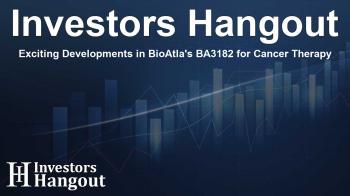Exciting Developments in BioAtla's BA3182 for Cancer Therapy

Promising Potential of BA3182 in Cancer Treatment
BioAtla, Inc. (NASDAQ: BCAB) is making strides in cancer therapy with its innovative treatment BA3182, a dual-conditionally binding bispecific T-cell engager. Recently, the company presented pivotal data regarding this therapy at the prestigious European Society for Medical Oncology (ESMO) Gastrointestinal Cancers Congress. This represents a significant milestone in the ongoing efforts to tackle treatment-refractory metastatic adenocarcinoma, a particularly challenging form of cancer.
New Findings from Phase 1 Study
During the ongoing Phase 1 dose-escalation trial, 39 patients suffering from heavily pretreated metastatic adenocarcinoma were administered BA3182, with doses ranging from 0.0026 mg to 0.6 mg weekly. The trial aims to determine optimal dosing and assess both safety and preliminary antitumor activity. With promising initial results, BioAtla is focused on establishing the recommended Phase 2 dosing to move forward effectively.
Low-Grade Adverse Events
Early data showcased a reassuring safety profile, with adverse events primarily low-grade and manageable. The company reported that Cytokine Release Syndrome, which was noted in some patients early in the trial, was resolved swiftly after implementing a preventative protocol. Furthermore, the safety data signals encouraging signs that patients can undergo weekly treatment without major interruptions.
Encouraging Tumor Response
One of the most significant conclusions from the trial involved tumor response. The results demonstrated that five patients achieved meaningful tumor size reductions across various types of adenocarcinomas, including colorectal and breast cancers. As BioAtla continues to escalate dosing, the outcomes so far suggest that BA3182 may offer a competitive edge in addressing these tough-to-treat cancers.
Understanding BA3182's Mechanism
BA3182 leverages BioAtla's proprietary Conditionally Active Biologics (CAB) platform, designed to target tumors while minimizing exposure to healthy tissue. This mechanism focuses on the Epithelial Cell Adhesion Molecule (EpCAM) which is commonly overexpressed in adenocarcinomas, allowing for selective targeting of tumor cells and creating a more effective therapeutic index. The dual targeting of EpCAM and CD3? presents a novel approach to enhance the body's immune response against cancer cells.
Strategic Importance of Research and Development
As BioAtla advances the development of BA3182, the company's robust research strategies will be crucial. Employing innovative dosing regimens and collecting comprehensive data will be key to understanding the full potential of this treatment. With clinical responses indicating signs of prolonged progression-free intervals, this treatment may soon be pivotal for many patients worldwide.
BioAtla's Future Prospects
Looking ahead, BioAtla is poised for future updates and potentially expanded trials, as preliminary data continues to be encouraging. The company's commitment to innovation in the oncology sector, underpinned by active patent coverage and a strong pipeline, positions it as a leader in targeting unmet medical needs.
The future of cancer therapy could see a leap forward with BA3182, helping to usher in a new era where advanced adenocarcinoma patients have access to promising treatment options. BioAtla believes that BA3182 could serve over a million patients globally, reflecting its ambition to transform treatment landscapes.
Frequently Asked Questions
What is BA3182 developed by BioAtla?
BA3182 is a dual-conditionally binding bispecific T-cell engager antibody developed to target solid tumors, specifically for patients with treatment-refractory metastatic adenocarcinoma.
How is the ongoing trial for BA3182 structured?
It is a Phase 1 dose-escalation clinical trial, involving cohorts of patients treated with varying doses to determine safety, tolerability, and preliminary efficacy.
What safety concerns were reported for BA3182?
The trial indicated that adverse events were low-grade and manageable, with Cytokine Release Syndrome being the primary concern resolved through proactive measures.
Why is BA3182 significant for cancer treatment?
BA3182 is significant because it targets EpCAM, which is prevalent in adenocarcinomas, allowing for enhanced specificity and reduced side effects compared to traditional therapies.
What are the future expectations for BA3182?
BioAtla anticipates pivotal updates regarding BA3182, potentially expanding into larger studies to validate its efficacy and safety in a broader patient population.
About The Author
Contact Riley Hayes privately here. Or send an email with ATTN: Riley Hayes as the subject to contact@investorshangout.com.
About Investors Hangout
Investors Hangout is a leading online stock forum for financial discussion and learning, offering a wide range of free tools and resources. It draws in traders of all levels, who exchange market knowledge, investigate trading tactics, and keep an eye on industry developments in real time. Featuring financial articles, stock message boards, quotes, charts, company profiles, and live news updates. Through cooperative learning and a wealth of informational resources, it helps users from novices creating their first portfolios to experts honing their techniques. Join Investors Hangout today: https://investorshangout.com/
The content of this article is based on factual, publicly available information and does not represent legal, financial, or investment advice. Investors Hangout does not offer financial advice, and the author is not a licensed financial advisor. Consult a qualified advisor before making any financial or investment decisions based on this article. This article should not be considered advice to purchase, sell, or hold any securities or other investments. If any of the material provided here is inaccurate, please contact us for corrections.

